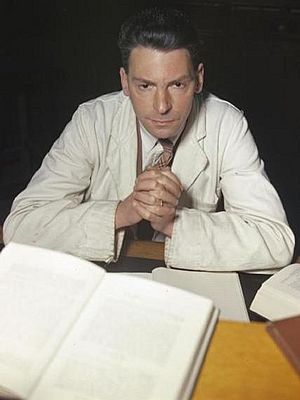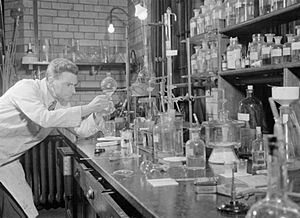Wilson Baker facts for kids
Quick facts for kids
Wilson Baker
|
|
|---|---|

Wilson Baker while at the Dyson Perrins Laboratory
|
|
| Born | 24 January 1900 |
| Died | 2 June 2002 (aged 102) |
| Alma mater | Victoria University of Manchester |
| Spouse(s) | Juliet Elizabeth Glaisyer |
| Children | Rosalind, Roger and Katharine |
| Awards | See text |
| Scientific career | |
| Fields | Chelation, inclusion compounds, penicillin and other natural products |
| Institutions | Dyson Perrins Laboratory University of Bristol |
| Doctoral advisor | Sir Robert Robinson |
Wilson Baker (24 January 1900 – 3 June 2002) was a brilliant British organic chemist. Organic chemists study chemicals that contain carbon, which are the building blocks of life! He was also a Fellow of the Royal Society, a very important group for scientists.
Contents
Early Life and Education
Wilson Baker was born in Runcorn on January 24, 1900. He was the youngest of four children. His father, Harry Baker, was also a chemist. He had studied with famous scientists like Sir Henry Enfield Roscoe and Robert Bunsen.
Wilson was very smart and started studying at the Victoria University of Manchester when he was just 16. During the First World War, he spent some time in France helping as a Quaker volunteer. He graduated at the top of his class in 1921.
After his first degree, he continued his studies. He earned a Master's degree (MSc) and then a PhD. For his PhD, he worked with Sir Robert Robinson. They focused on making isoflavones, which are natural compounds found in plants. Wilson received his PhD in 1924 and became an assistant lecturer.
Time at Oxford University
The years Wilson Baker spent in Oxford were very important for his career.
- In 1927, he started working at the Dyson Perrins Laboratory. This lab was a famous place for chemistry research.
- He became a University Lecturer and Demonstrator there in 1928.
- In 1930, he became a member of New College.
- He earned another degree, a DSc, from Manchester in 1933.
- From 1936 to 1944, he was a Fellow and a Chemistry teacher (called a Praelector) at The Queen’s College, Oxford.
Leading Chemistry in Bristol
After 17 years in Oxford, Wilson Baker moved to the University of Bristol in 1944. He became the head of Organic Chemistry there. He stayed in this important role until he retired in 1965.
The years after the war were tough for universities. Labs needed repairs and new equipment. Wilson Baker worked hard to build up the chemistry departments at Bristol. He worked with other professors like W.E. Garner and D.H. Everett. Today, the chemistry department in Bristol hosts a special "Wilson Baker Lecture" every year to remember his contributions.
Important Discoveries
Wilson Baker's research covered many exciting areas in chemistry. He studied:
- Chelation: This is about how certain molecules can "grab" onto metal ions.
- Inclusion compounds: These are special compounds where one molecule is trapped inside another.
- Penicillin: He worked on this famous antibiotic, which helps fight infections.
- Natural products: These are chemicals found in nature, often from plants or fungi.
His detailed work is described in a special report by the Royal Society.
Family Life
Wilson Baker married Juliet Elizabeth Glaisyer on August 4, 1927. She was also a Quaker. They had three children together: Rosalind, Roger, and Katharine.
Wilson Baker lived a very long life, passing away on June 3, 2002, at the age of 102. His wife, Juliet, had passed away in 1991. He was outlived by his three children.


